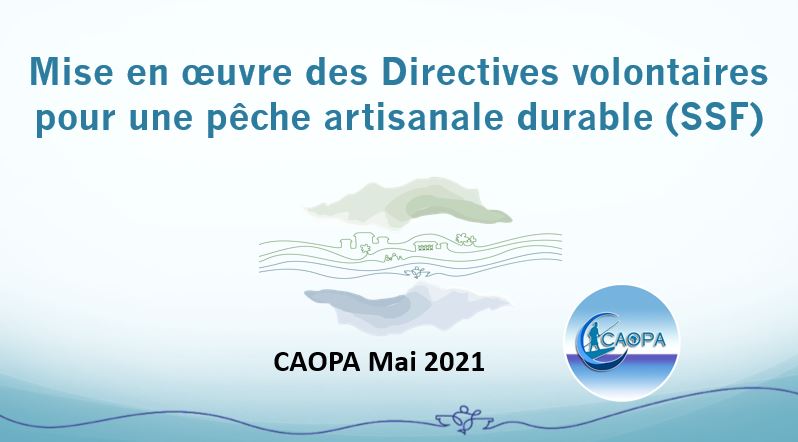Mali: CAOPA on the way to implementing the SSF Guidelines
The African Confederation of Professional Organizations of Artisanal Fisheries (CAOPA), FAO, the national collective of fish industry organizations in Mali in collaboration with the Ministry in charge of fisheries is organizing a workshop in Bamako on 20 and 21 May 2021 to “share and discuss on/raise awareness of the Voluntary Guidelines for sustainable small-scale fisheries” in the context of food security and the fight against poverty.
This workshop will bring together forty artisanal fisheries professionals, civil society support organisations, representatives of the concerned administrations (research, administrations in charge of fisheries, the environment, health, education and tourism) and other institutions involved in the management of the sector.
This forum has a double objective: “to exchange on the content and approach of the SSF Guidelines … for an upgrading of the stakeholders; and to discuss on the development of a national action plan for sustainable small-scale fisheries“.
During 48 hours, the participants will examine the situation of artisanal fisheries in Mali, discuss on the ways and means of implementing the SSF Guidelines at national level (National Action Plan), in particular: [identify the most urgent aspects and issues to be taken into account such as, for example: food security, poverty eradication, job creation and consolidation, governance emphasizing equity mainly with regard to women, sustainable management of resources in a favourable environment]; identify possible priority areas of intervention and stakeholders; and finally reflect on the setting-up of an operational coordination and monitoring and evaluation mechanism for activities.
What are the SSF Guidelines?
“The Voluntary Guidelines for Sustainable Artisanal Fisheries in the Context of Food Security and Poverty Eradication are a set of international agreements on the management and development of sustainable artisanal fisheries,” reads the workshop’s concept note.
The orientations and measures contained in Guidelines are relevant tools which, if well implemented, can help to improve the current performance of this sub-sector and the fisheries sector as a whole in member countries. Based on this conviction of the relevance of the content and approach of the Voluntary Guidelines for Sustainable Small-scale Fisheries, CAOPA is committed to working with States and FAO to disseminate and apply them according to the specificities of each member country in Africa. Therefore, this workshop is organized.
What is the importance of the Sustainable Small-scale Fisheries Guidelines for artisanal fisheries in Africa?
“The guidelines aim to support millions of men and women, particularly in developing countries, in defending their human rights and safeguarding the resources on which they depend for their livelihoods,” the note said.
They are a key tool to encourage the implementation of national policies, practices and behaviours in favour of sustainable small-scale fisheries, in order to strengthen the fundamental contribution of this sub-sector to food security and poverty eradication.
They are particularly important for the sustainable development of artisanal fisheries in Africa, given the importance of this sub-sector for the continent and require that FAO member states and all their partners take up the challenge of implementation.
Today, the note says, 100 million men and women are employed in African artisanal fisheries, which contribute 60% of the sector’s production. Most of this fish is used to feed local populations. More than 200 million Africans depend on fish as their main source of protein and vitamins. Artisanal fishing is a safety net for social stability everywhere.
What about the process of developing the SSF Guidelines?
The SSFs are the result of a participatory process based on a bottom-up approach. From 2010 to 2013, FAO facilitated a global process that involved more than 4,000 representatives of governments, artisanal fishers, fish workers and their organisations, researchers, development partners and other relevant stakeholders from over 120 countries. The text resulting from these consultations served as the basis for an FAO technical consultation, whose members met in May 2013 and February 2014 to finalise the document.
The approval of the Guidelines on Small-scale Fisheries by the Committee on Fisheries at its thirty-first session in June 2014 is a major step towards a safe and sustainable small-scale fisheries sector.
Importantly, the Guidelines are voluntary, focused on the needs of developing countries, and specific to small-scale fisheries in marine and inland waters and apply to both fishing and related post-harvest and upstream activities. They support regional and international initiatives for poverty reduction and equitable social and economic development, with the aim of improving fisheries governance and encouraging sustainable use of resources.
Aliou Diallo






Comments are closed